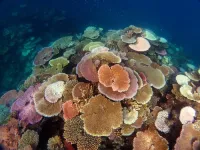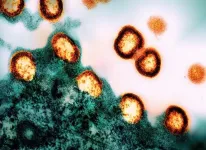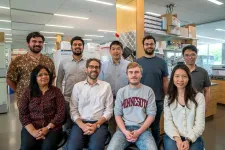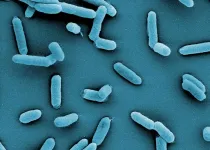(Press-News.org) An international team of researchers led by the University of Adelaide has projected future marine heatwaves will cause coral reefs to be at severe risk of bleaching for longer periods than previously seen.
Through climate modelling and supercomputing, the researchers discovered that extended bleaching events may significantly disrupt coral spawning.
“We found that coral bleaching will start earlier in the year and last longer than previously thought,” said lead author Dr Camille Mellin, from the University of Adelaide’s Environment Institute.
“Our results show that by 2080, coral bleaching will tend to start in spring, rather than late summer, which could potentially threaten coral reproduction success.
“In many regions coral spawning occurs once a year, in spring, and our modelling projects a high risk that coral bleaching will coincide with this reproductive event, which will be devastating for thousands of coral species.”
Marine heatwaves cause corals to become stressed and expel the symbiotic algae living in their tissue, leaving corals white and weakened.
While widespread coral bleaching is a recent phenomenon, four global mass bleaching events have occurred since 1998, the most recent two occurring in this decade.
This recent discovery, published in the journal Science Advances, establishes the severity, timing and duration of severe bleaching risk in the 21st century for Earth’s coral reefs, showing that mass bleaching events are going to continue to become even more frequent in the future.
“Our projections of daily heat stress show that the greatest risk of severe coral bleaching this century will be along the equator, which is also home to the most biodiversity-rich coral reefs,” said Associate Professor Damien Fordham, from the University of Adelaide’s Environment Institute.
“Coral reefs in these equatorial regions, including Indonesia’s Coral Triangle, could face near constant bleaching conditions by the end of the century.
“Unfortunately, marine species in these regions are already living at temperatures near their upper tolerance levels and so are particularly ill-equipped to adapt to accelerated climate change, making them highly vulnerable to extinction.”
Low-latitude coral reef regions support food and nutrition for millions of people worldwide, with local populations relying on coral reef fisheries for income.
These new results, accompanied by an online data portal, will help reef managers identify regions of lower bleaching risk where coral conservation actions can be prioritised and corals best saved.
“Our validated projections of future coral bleaching risk are based on daily marine heatwave forecasts, which represent a critical improvement over past approaches” said Professor Scott Heron, a co-author from James Cook University.
“These next-generation projections will be crucial for developing conservation strategies aimed to protect and restore coral reefs in regions at lesser risk of future climate change. These are areas where conservation success is most likely.”
END
Future risk of coral bleaching set to intensify globally
2024-06-26
ELSE PRESS RELEASES FROM THIS DATE:
The science of procrastination
2024-06-26
Procrastination, the deliberate but detrimental deferring of tasks, has many forms. Sahiti Chebolu of the Max Planck Institute for Biological Cybernetics uses a precise mathematical framework to understand its different patterns and their underlying reasons. Her insights could help tailor individual strategies to tackle the issue.
“Why did I not do this when I still had the time?” – Whether it is filing taxes, meeting a deadline at work, or cleaning the apartment before a family visit, most of us have already wondered why we tend to put off certain tasks, even in the face of unpleasant consequences. Why do we make decisions that are harmful to us – against our better ...
Saudi women’s quest for change enabled them earn citizenship rights
2024-06-26
Saudi women have obtained their citizenship rights through their own struggle and there is little truth in the widely held idea in the West that their role in the fight for their freedom has been negligible.
The finding is part of a new research in the journal Diogenes authored by Zahia Salhi, a professor at Sharjah University’s College of Arts, Humanities, and Social Sciences. The University of Cambridge Press has also posted Prof. Salhi’s research online.
“Far from being passive victims of their society, Saudi women are active agents ...
Introducing Sir Stanley: Binghamton University professor and Nobel Prize winner knighted by King Charles
2024-06-26
BINGHAMTON, N.Y. -- Binghamton University, State University of New York Distinguished Professor and Nobel Prize Laureate M. Stanley Whittingham has been named a Knight Bachelor “for his services to research in chemistry.”
The honor entitles him to be known as Sir Stanley, or Sir Stanley Whittingham, and was announced as part of King Charles III’s official birthday honours list.
In his 30-plus-year career, Whittingham has been a pioneer in the development of lithium-ion batteries, for which he won the Nobel Prize in Chemistry in 2019. ...
NIH statement on preliminary efficacy results of twice-yearly lenacapavir for HIV prevention in cisgender women
2024-06-26
The injectable antiretroviral drug lenacapavir was safe and 100% effective as long-acting HIV pre-exposure prophylaxis (PrEP) among cisgender women in a Phase 3 clinical trial, according to top-line findings released by Gilead Sciences, Inc., the study sponsor. Lenacapavir is administered every six months, making it the most durable HIV prevention method to have shown efficacy in this population. NIAID applauds the study sponsor, investigators, study staff, and—most importantly—the participants ...
Neurobiologist Joshua C. Brumberg named CUNY Graduate Center president
2024-06-26
The City University of New York has appointed Joshua C. Brumberg as president of the CUNY Graduate Center, making permanent a post he has held on an interim basis since October 2023. Brumberg, a neurobiologist who has been a faculty member, dean and researcher during his 22-year career at CUNY, will lead the University’s renowned center of graduate education, scholarship and public-interest research. CUNY’s Board of Trustees approved the appointment at its meeting last night.
“Dr. Brumberg has played a key role in expanding CUNY’s research enterprise over the past several years,” said Chancellor Félix V. Matos Rodríguez. “A ...
Cell division: Before commitment, a very long engagement
2024-06-26
Before a cell commits fully to the process of dividing itself into two new cells, it may ensure the appropriateness of its commitment by staying for many hours—sometimes more than a day—in a reversible intermediate state, according to a discovery by researchers at Weill Cornell Medicine. Their revelation of this fundamental feature of biology includes details of its mechanisms and dynamics, which may inform the development of future therapies targeting cancers and other diseases.
In their study, published June 26 in Nature, the researchers developed new tools allowing them to track over time the activation state of E2F, a ...
New tool enables faster, more cost-effective genome editing of traits to improve agriculture sustainability
2024-06-26
ST. LOUIS, MO, June 26, 2024 – With the goal of reducing the time and cost it takes to bring an improved crop to the marketplace, research conducted in the laboratory of Keith Slotkin, PhD, and his colleagues in the Plant Transformation Facility at the Donald Danforth Plant Science Center, was recently published in the scientific journal Nature. The publication Transposase-assisted target site integration for efficient plant genome engineering focuses on technology called TATSI (Transposase-Assisted Target Site Integration), which uses transposable elements to integrate custom DNA into specific sites in plant genomes.
The ...
Unlocking the world of bacteria
2024-06-26
Bacteria populate virtually every habitat on Earth, including within and on our own bodies. Understanding and engineering bacteria can lead to new methods for diagnosing, treating, and preventing infections. Additionally, it presents opportunities to protect crops from disease and create sustainable cell factories for chemical production, reducing environmental impact — just a few of the many benefits to society. To unlock these advantages, scientists need the ability to manipulate the genetic content of these bacteria. However, a longstanding bottleneck in genetically engineering bacteria has been the efficient ...
Argonne to support new AI for science projects as part of the National AI Research Resource Pilot
2024-06-26
The U.S. Department of Energy’s (DOE) Argonne National Laboratory will support three innovative artificial intelligence (AI)-driven science projects as part of the first round of awards from the National Artificial Intelligence Research Resource (NAIRR) Pilot.
Led by the National Science Foundation (NSF) in collaboration with DOE and several partners, the NAIRR Pilot aims to provide researchers and students with expanded access to key AI resources and data. NAIRR’s ultimate goal ...
Stress testing pension funds: Lithuanian researchers lead global innovation
2024-06-26
“We wanted to investigate how second pillar pension funds react to financial crises and how to protect them from the crises,” says Kaunas University of Technology (KTU) professor Dr Audrius Kabašinskas, who, together with his team, discovered a way to achieve this goal. The discovery in question is the development of stress tests for pension funds. Lithuanian researchers were the first in the world to come up with such an adaptation of the stress tests.
Stress tests are usually carried out on banks or other financial institutions to allow market regulators to determine and assess their ability to withstand adverse economic conditions.
According to the professor at ...








